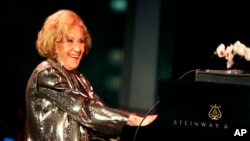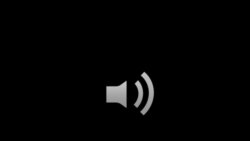Marian McPartland, one of the best-known jazz artists in America, died August 20 in Port Washington, New York. She was 95. A musician who broke ground for women instrumentalists in the 1940s and ‘50s, she would later become best known as host of the long-running radio program “Piano Jazz.”
McPartland’s elegant approach to jazz gracefully spanned several major eras, from swing to bebop and beyond. McPartland brought the musical knowledge earned over decades playing in nightclubs to National Public Radio, where for more than 30 years she hosted “Piano Jazz,” a program that mixed conversation and performance with many of the world’s best musicians.
Born Margaret Marian Turner in Windsor, England, as a girl she took up piano. To her parents’ dismay, when she was 20 she left home to join a four-piano vaudeville act. On a tour playing for Allied troops during World War II she met American jazz trumpeter Jimmy McPartland. They married, and, after the war, moved to the United States. With her husband's encouragement, McPartland went on to lead her own small bands.
McPartland landed a steady job performing at a New York City jazz club, the Hickory House. She played there for eight years, and developed a reputation not only for her fine piano playing, but for her melodic original compositions. Her songs were recorded by singers such as Tony Bennett, Sarah Vaughan, and Peggy Lee.
At first, McPartland was so nervous about her songwriting she wouldn't take the credit for her own tunes.
"Years ago, I felt very insecure about writing songs, and I wrote one at the Hickory House," she said. "Somebody said, 'That's a nice song,' so then it was O.K. for me to say that I had written it. Isn't that sick?"
Starting in the 1960s, McPartland traveled to schools around the United States, encouraging students to develop an appreciation for jazz. She would use popular songs to introduce young listeners to the many sounds of jazz.
"I'll probably pick a tune that they know, something they've all heard, like the theme of [television program] 'M.A.S.H.,' for instance. They all know that. Then I'll do it another way, maybe like jazz, blues or something slow. And I'll go through a whole thumbnail history of jazz. I'll do some boogie-woogie and so on, and really kind of grab them with that. But as long as you know tunes that they know, I think that helps a lot."
McPartland took that approach to the airwaves in 1979. Her weekly show, “Piano Jazz” became one of the most popular programs on public radio, airing across the United States for over three decades. Each week she would engage noted musicians in casual, relaxed interviews. She would take turns with her guests playing songs, and then would perform duets with them. Both in its music and its conversations, McPartland’s “Piano Jazz” expressed the core jazz virtue of improvisation.
The National Endowment for the Arts recognized McPartland as a “Jazz Master” in 2000. Four years later she won a special Grammy Award for her lifetime achievement. She continued to perform and broadcast into her 90s.
McPartland’s elegant approach to jazz gracefully spanned several major eras, from swing to bebop and beyond. McPartland brought the musical knowledge earned over decades playing in nightclubs to National Public Radio, where for more than 30 years she hosted “Piano Jazz,” a program that mixed conversation and performance with many of the world’s best musicians.
Born Margaret Marian Turner in Windsor, England, as a girl she took up piano. To her parents’ dismay, when she was 20 she left home to join a four-piano vaudeville act. On a tour playing for Allied troops during World War II she met American jazz trumpeter Jimmy McPartland. They married, and, after the war, moved to the United States. With her husband's encouragement, McPartland went on to lead her own small bands.
McPartland landed a steady job performing at a New York City jazz club, the Hickory House. She played there for eight years, and developed a reputation not only for her fine piano playing, but for her melodic original compositions. Her songs were recorded by singers such as Tony Bennett, Sarah Vaughan, and Peggy Lee.
At first, McPartland was so nervous about her songwriting she wouldn't take the credit for her own tunes.
"Years ago, I felt very insecure about writing songs, and I wrote one at the Hickory House," she said. "Somebody said, 'That's a nice song,' so then it was O.K. for me to say that I had written it. Isn't that sick?"
Starting in the 1960s, McPartland traveled to schools around the United States, encouraging students to develop an appreciation for jazz. She would use popular songs to introduce young listeners to the many sounds of jazz.
"I'll probably pick a tune that they know, something they've all heard, like the theme of [television program] 'M.A.S.H.,' for instance. They all know that. Then I'll do it another way, maybe like jazz, blues or something slow. And I'll go through a whole thumbnail history of jazz. I'll do some boogie-woogie and so on, and really kind of grab them with that. But as long as you know tunes that they know, I think that helps a lot."
McPartland took that approach to the airwaves in 1979. Her weekly show, “Piano Jazz” became one of the most popular programs on public radio, airing across the United States for over three decades. Each week she would engage noted musicians in casual, relaxed interviews. She would take turns with her guests playing songs, and then would perform duets with them. Both in its music and its conversations, McPartland’s “Piano Jazz” expressed the core jazz virtue of improvisation.
The National Endowment for the Arts recognized McPartland as a “Jazz Master” in 2000. Four years later she won a special Grammy Award for her lifetime achievement. She continued to perform and broadcast into her 90s.







